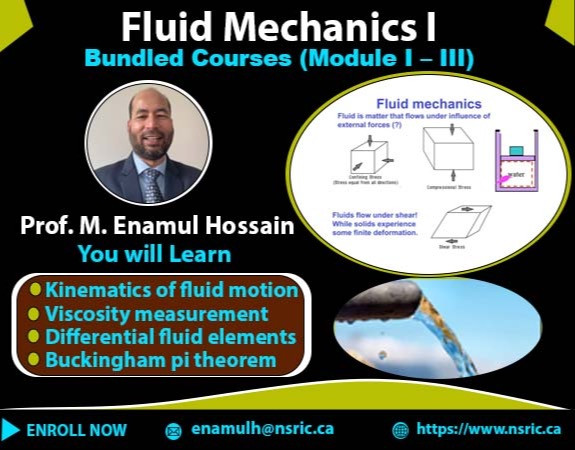

The objectives of fluid mechanics are to help us understand the behavior of fluid under various forces and at different atmospheric conditions, to select the proper fluid for various applications and to understand the nature of fluid statics, in particular, dealing with problems related to hydrostatic forces. Fluid mechanics is a branch of physics that studies fluids and their behaviors in response to different forces. The bundled courses program begins with an overview of the fundamentals of fluid mechanics concepts step-by-step with specific workout examples to address the above objectives. The bundled courses program covers three modules. A complete discussion is presented on different concepts, as highlighted in the section below. Fluid mechanics (Module I) introduces students to the fundamental concepts of fluids and their properties, fluid statics, kinematics of fluid motion and conservation of mass. This module covers the topics of fluid mechanics such as characteristics of matter, viscosity, viscosity measurement, surface tension and capillarity, pressure variation for compressible and incompressible fluids, measurement of static pressure, hydrostatic force on a plane surface, buoyancy, stability, constant translational acceleration, and a steady rotation of a liquid fluid flow descriptions, types and graphical descriptions of fluid flow, fluid acceleration, streamline coordinates, finite control volumes, the Reynolds transport theorem, volumetric flow, mass flow, and average velocity. Module II introduces the basic concepts of work and energy of moving fluids, fluid momentum and differential fluid flow. This module covers the topics of fluid mechanics such as Euler's equations of motion, Bernoulli equation and its applications, energy and hydraulic grade lines, energy equation, linear momentum equation, applications to bodies at rest and bodies having constant velocity. Students will be able to analyze the problems related to elementary fluid dynamics, especially for incompressible flows using the Bernoulli equation in particular. The module also covers the angular momentum equation, propellers and wind turbines, applications for control volumes having accelerated motion, turbojets and turbofans, rockets, differential analysis, kinematics of differential fluid elements, circulation and vorticity, conservation of mass, equations of motion for a fluid particle, stream and potential functions, basic two-dimensional flows, Nevier-Stokes equations, and computational fluid dynamics. Module III introduces the fundamental concepts of dimensional analysis and similitude, laminar and turbulent flow within pipe, and analysis and design for pipe flow. This module covers the topics of fluid mechanics such as important dimensionless numbers, the Buckingham π-theorem, some general considerations related to dimensional analysis, similitude, types of flow regime, viscous flow within enclosed surfaces, steady laminar flow between parallel plates and smooth pipe. The course also covers the Reynolds number, fully developed flow from an entrance turbulent flow within a smooth pipe, losses occurring from pipe fittings and transitions, single-pipeline flow, and pipe systems. This module explains each concept in detail and with enough examples and illustrations. This approach will make the students interested in enrolling in these courses. Upon successful completion of this bundled course the students will be able to (i) understand the various properties of fluids and their influence on fluid motion, (ii) analyse a variety of problems in fluid statics and dynamics including dimensional analysis and (iii) calculate the forces that act on different planes and curves. This program is a foundation, resource guide and an excellent source for science and engineering students, early career professionals, and executives who want to learn concepts, design, and dimensions through enough practice of the theories and examples. The different modules are designed for individuals and students who need to understand the basics of fluid mechanics where Euler's equation, Bernoulli equation, dimensional analysis, important dimensionless numbers, and Buckingham π-theorem are the main focus. Each bundled course (Module I, II and III) contains a total of 10, 9 and 11 lectures respectively. Each lecture comprises 20 to 35 PowerPoint presentation slides and pdf documents. The courses are also designed with two quizzes, two assignments and one final exam in Module III. Students are strongly advised to complete the “Fundamentals of Thermodynamics (Module I – III)” course by Prof. M. Enamul Hossain at NSRIC Platform to understand this course content.
Dr. M. Enamul Hossain | Author Level 1
Dr. M. Enamul Hossain | Author Level 1
Dr. M. Enamul Hossain | Author Level 1

Dr. M. Enamul Hossain
Phd
Prof. M. Enamul Hossain
CEO & President, and
NSRIC Chair in Sustainable Energy
Prof. Mohammed Enamul Hossain is the founder and CEO & President at NSRIC Inc. He is also the NSRIC Chair Professor in sustainable energy at the Engineering (ENG) Unit of OE Division. In addition to his current affiliation with NSRIC, he holds adjunct Professor positions in some other universities. Prof. Hossain is the founder and the Chairman of NSRIC International School in Toronto (NIST), NSRIC International College in Toronto (NICT), Canada and the World Association of Nature Science, Education and Engineering (WANSEE), Canada. He is also CEO of NSRIC Green Supplies Inc., Canada, and the founder of International Conferences on Nature Science and Engineering Applications (ICNSEA), Canada, a conference series. Prof. Hossain was the Managing Director and Director for Aziza Consulting and Construction Ltd. in Bangladesh, and BrightCoral, Canada, respectively. He was the President of ANS Research and Development Inc., Canada. Prof. Hossain has been the Founder and Chairman of a Charitable organization, Aziza Trust, since 2009, through which he is serving mankind and established NSRIC Education City in Chattogram, Bangladesh, to offer education to unprivileged students. Prof. Hossain also worked in the oil industry for about ten years in different administrative and technical positions. He is a recognized petroleum engineering consultant for the oil and gas industry. Prof. Hossain offered many training programs and courses at different organizations globally, such as Saudi Aramco, ONGE, Kuwait Oil, BPI, Qatar Petroleum, Petronas and ADNOC through different training organizations.
In 29+ years of professional career, Dr. Hossain has a diversified and very rich record of leadership, management, business development, teaching, research, and technical achievements. Prior to his current position, Prof. Hossain was the first Statoil Chair Professor at Memorial University of Newfoundland (MUN) in St. John’s, Newfoundland, Canada. He held different academic and administrative positions at MUN, Canada; Ryerson University, Canada; King Fahd University of Petroleum and Minerals (KFUPM), Saudi Arabia; Dalhousie University, Canada; Sultan Qaboos University (SQU), Oman; American University in Cairo (AUC), Egypt; Chittagong University of Engineering & Technology (CUET), Bangladesh; and Nazarbayev University, Kazakhstan. Moreover, he served as an adjunct Professor at many universities worldwide and worked at different universities. He is recognized as one of the most successful entrepreneurs and academic leaders. He also established his high research skills in petroleum engineering and sustainable energy, securing over US$16.9 million in research funding. The funding agencies include Statoil, Saudi Aramco, NSTIP, NSERC, RDC, KFUM, MUN, and AUC. Prof. Hossain’s main contribution to the industry is introducing the first-time memory concept for a petroleum application and US patents.
Prof. Hossain earned a BSc in Mechanical Engineering from the Bangladesh University of Engineering and Technology (BUET) in 1995 and an MSc in Petroleum and Mineral Resources Engineering from a collaboration between the University of Alberta and BUET in 2001. Dr. Hossain was awarded PhD in sustainable Petroleum Engineering in 2008 and an MBA degree in 2009, both from Dalhousie University, Nova Scotia, Canada.
This philanthropist scholar and philosopher authored ten books on different areas of sustainability and petroleum engineering with Elsevier and Wiley and Scrivener Publishing, USA. He authored/co-authored over 200+ scientific articles. In addition, Prof. Hossain has 11 US patents, some of which are in the process of commercialization.
